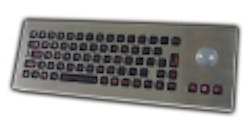Single-chip navigation and guidance device that combines inertial measurement and timing is goal of DARPA TIMU program
ARLINGTON, Va., 17 Oct. 2010. Scientists at the U.S. Defense Advanced Research Projects Agency (DARPA) in Arlington, Va., are asking industry to develop a miniature, power-efficient inertial navigation and guidance device that combines precision timing and inertial measurement on one chip for applications like personal navigation, unmanned aerial vehicles (UAVs), unmanned underwater vehicles (UUVs), and compact munitions.
DARPA issued a broad agency announcement (DARPA-BAA-11-10) Friday for the Single Chip Timing and Inertial Measurement Unit (TIMU) program to address key challenges and potential benefits of developing microscale components for advanced precision navigation, guidance, and control for military systems. The focus is on a single-chip, self-contained system that provides precise timing, location, and orientation information.
The TIMU program seeks to help fill precision military navigation and guidance needs during periods when Global Positioning System (GPS) satellite navigation capability is not available. DARPA officials say miniaturizing timing and inertial measurement units is the only way to enable navigation, guidance, and control (NG&C) on miniature platforms.
Current inertial navigation systems, they explain, do not meet the performance and size, weight, power, and cost (SWaP+C) requirements for many emerging U.S. Department of Defense (DOD) applications, including those needed for personal navigation, unmanned air/underwater vehicles, and compact munitions. Today's devices that combine timing and inertial measurement units are still bulky, power-hungry, and expensive.
The primary goal of the DARPA TIMU program finding ways to develop a self-sufficient navigation system no larger than 10 cubic millimeters that operates on 200 milliwatts or less, and drifts less than one nautical mile per hour. DARPA scientists are interested in innovative manufacturing and advanced architectures that integrate timing and inertial measurement units.
Ultimately, DARPA officials want to develop a high-yield process for batch manufacturing of high-performance TIMUs that operate in harsh military environments; develop modeling tools to develop individual components, sensor array, and packaging for single-chip TIMUs; demonstrate a TIMU design with reduced power and improved accuracy in measurements of time, position, and orientation; and demonstrate a “black box” level performance for a TIMU that measures timing, position, and orientation in harsh military environments.
Developing all necessary components of a chip-scale TIMU in a small volume will require some major redesign of individual components and innovation in integration. This program focuses on integration-by-design of clocks and inertial sensors on a single-chip TIMU through wafer-level fabrication and packaging, efficient predictive modeling tools, new architectural designs, and systems integration.
Companies interested in participating in the should submit proposal abstracts to DARPA no later than noon eastern time on 24 Nov. 2010. Full proposals are due 25 Jan. 2010. DARPA officials say they expect to award several contracts for this project.
For questions or concerns, contact the DARPA TIMU program manager, Dr. Andrei Shkel, by phone at 703-351-8468, by e-mail at [email protected], by fax at 703-812-5051, or by post at DARPA/MTO, ATTN: DARPA-BAA-11-10, 3701 North Fairfax Drive, Arlington, Va. 22203-1714.
More information is online at http://www.fbodaily.com/archive/2010/10-October/17-Oct-2010/FBO-02311664.htm.
